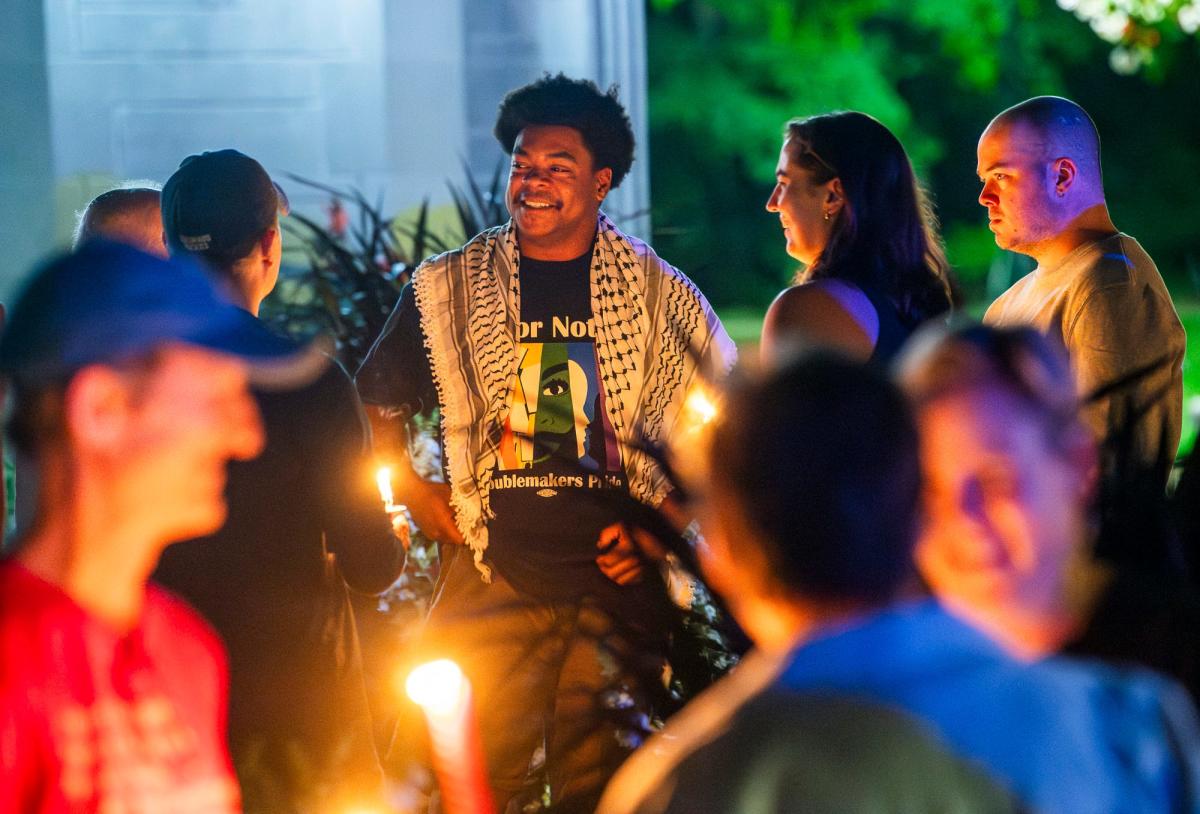
Indiana University’s new expressive activity policy is being enforced already — during the first week of the fall semester. On Tuesday, IUPD reported at least two people to the vice provost for faculty and academic affairs and student conduct office for violating policy by gathering for an event after 11 p.m.
Ben Robinson, an associate professor of Germanic studies, and Bryce Greene, an informatics graduate student and founder of IU’s Palestine Solidarity Committee, were referred to the College of Arts and Sciences dean and the Senior Associate Dean of Students, respectively, for speaking at a candlelight vigil held Sunday night. The vigil at the Sample Gates, meant to “[mourn] the loss of freedom of expression at Indiana University,” was strategically held at 11:30 p.m. to violate the expressive activity policy, which requires protests, assemblies, and other protected speech on campus take place between 6 a.m. and 11 p.m.
The vigil was attended by approximately 40 people, per reporting from the Indiana Daily Student (IDS), and featured speeches from Robinson, Greene, professor emeritus Russ Skiba and others. Those in attendance said IUPD officers were stationed around the perimeter of Sample Gates, but did not interfere.
IU student, professor reported to conduct offices by IUPD
On Tuesday evening, Greene received an email from Senior Associate Dean of Students Libby Potts informing him IUPD had reported him to the student conduct office. Potts requested to meet with Greene to discuss the report and either enter into an “Alternative Resolution Process” or adjudicate the issue through the student conduct office. The email said Greene could face sanctions including “disciplinary probation, suspension, or expulsion” based on the findings of the student conduct office.
“I have a meeting to either accept full responsibility and acknowledge the harm I did, or I can challenge it,” Greene said.
IU spokesperson Mark Bode would not say if anyone else was reported by IUPD and will face conduct violations, stating IU “does not comment on individual misconduct cases.”
Robinson said the vigil was held at 11 p.m. both to “test the enforcement” of the new policy and to demonstrate the passion of community members for protesting issues with “pressing urgency.”
“It wasn’t a prank,” Robinson said. “We wanted to draw attention to the draconian threat of the policy, and we want to understand the policy.”Before the expressive activity policy was approved in July, IU’s restrictions were specific to Dunn Meadow. The new policy applies throughout IU Bloomington’s campus, as well as the other IU campuses.
Faculty say broad policy could chill protected speech
The policy has been criticized by faculty and students for being broad and having the potential to severely limit speech. As passed by the trustees, the policy doesn’t say if expressive activities can take place past 11 p.m. in private residential spaces like dorms. A free speech FAQ page on IU’s website says expressive activity “must not take place in areas that are used for instructional, administrative, or residential purposes, or are not otherwise open to the general public, such as classrooms, studios, laboratories, residential space, construction sites, or office areas.”
In a faculty email thread about Robinson having been reported to the dean, Middle Eastern Languages and Cultures professor John Walbridge said the policy was “absurdly overbroad.”
“Does it cover individual conversations? Visiting speakers who run late? Muslim students doing Qur’an recitation on the Night of Power? Students celebrating a football victory? Election night watch parties?” Walbridge said in an email. “It is not even clear whether the policy applies only to outdoor activities or also includes indoor activities.”
Robinson said the misconduct notices against himself and Greene during the first week of the fall semester set a tone of free speech restriction at IU, which he believes the campus community will continue to push back against this year.
“Stakeholders across the board – students, faculty, staff members – people are really intent on expressing themselves,” Robinson said. “IU stakeholders aren’t just going to cede the rights that the administration wants to deny us.”
Reach Brian Rosenzweig at brian@heraldt.com. Follow him on Twitter/X at @brianwritesnews.
This article originally appeared on The Herald-Times: Indiana University expressive activity policy bans midnight vigil
EMEA Tribune is not involved in this news article, it is taken from our partners and or from the News Agencies. Copyright and Credit go to the News Agencies, email news@emeatribune.com Follow our WhatsApp verified Channel





